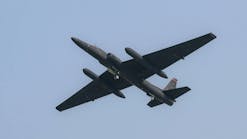Air traffic controllers at Long Island MacArthur Airport said yesterday that the facility's control tower is plagued by roof leaks, chronic overheating and two blind spots on taxiways that can create hazards when airplanes slip momentarily from view.
"Any blind spot is a potentially hazardous situation," said Cliff Peschansky, who has worked spotting planes from the Islip tower for 16 years. "Air traffic controllers hate surprises."
Islip Town Supervisor Phil Nolan insisted the problems pose no immediate threat to the safety of the 1.1 million passengers who pass through MacArthur yearly. Nevertheless, Nolan joined with Rep. Steve Israel (D-Huntington) yesterday at a news conference held at the tower's base, where they called on the Federal Aviation Administration to expedite construction of a new, taller tower they estimate will cost $16 million.
FAA spokeswoman Arlene Murray said the FAA believes the facility is safe. The new tower "is in the design stage," she said, and slated for completion in 2010.
But Israel said four years is much too long for MacArthur's air controllers to toil under what he described as "deplorable working conditions."
"We want the FAA to make the emergency repairs now," Israel said.
Inside the 40-year-old control tower - replete with peeling paint and sagging ceiling tiles - the most readily apparent problem is the oppressive heat. Controllers say the circa-1942 steam radiator system can't be regulated at all. Yesterday the temperature inside the fourth-floor breakroom hovered at 83 degrees. Controllers said the metal-roofed, glass-walled observation deck upstairs is worse, roasting occupants like "a greenhouse" on sunny days. Controllers keep comfortable and alert with the help of air conditioners they operate even in December.
"Those air conditioners will run basically every day in winter," Peschansky said.
Another controller, Russ Itzkia, a 20-year veteran at MacArthur, pointed out a bathroom where cascades of rusty water had gushed from the ceiling after recent rains. "This building is rancid," Itzkia said.
Perhaps the most worrisome feature of the seven-story tower - 50 feet short by the FAA's own estimates - are the two blind spots controllers cope with daily. To the west, a blue and white Army National Guard hangar - as long as a football field - hides a taxiway on which small airplanes roll toward the main runway. To the east, four gates of the new Southwest Air terminal can't be seen at all, obscured by the new building's height.
"We just have to make sure that when we see a plane go into the blind spot we check that it comes out, too," said Peschansky, adding that the problems pose no immediate threat to passengers. "They're safe. What happens is the problems make a difficult job more difficult."
Yesterday's revelations are hardly the first safety problem to dog MacArthur in recent months. In June, Newsday reported that deteriorating aprons outside Gates 5-8 at the Southwest terminal pose potential safety hazards to aircraft using the gate area. Southwest's fleet is composed of Boeing 737s, an aircraft whose low-slung engine is known for its tendency to collect debris.
In August, Islip Town shut down the airport's T.G.I. Friday's restaurant after Newsday reported the town failed to install required sprinklers outside the eatery.
Months of turbulence
Problems at Long Island MacArthur Airport
JUNE 9, 2006 Newsday reports that hazardous cracks have appeared in the newly installed apron outside the new terminal.
JUNE 16 Rep. Steve Israel asks the inspector general of the U.S. Transportation Department to investigate the cracked apron.
JUNE 20 Suffolk County District Attorney Thomas Spota says his investigation has uncovered significant fire hazards at the airport.
JUNE 21 Islip officials say the airport is safe.
JUNE 26 Sen. Charles Schumer asks the U.S. attorney general to look into the funding of the airport expansion to determine whether taxpayers were cheated. This is in response to a Newsday story detailing that at least $65.2 million in public funds were being spent on the project.
JUNE 30 Newsday reports that work had not begun on a $1-million ventilation system upgrade approved a year earlier.
JULY 6 Islip officials cannot locate records to prove fire inspections were done at the airport.
AUG. 1 Newsday reports that an Islip fire marshal warned the town of fire hazards more than two years earlier, but the town did not begin addressing them until they became public in June.
AUG. 2 Islip town engineer Steven Rizzo pleads guilty to criminal charges for allowing an airport restaurant to open in violation of state fire-safety codes. The restaurant, T.G.I. Friday's, closes.
Copyright 2005 LexisNexis, a division of Reed Elsevier Inc. All rights reserved.
Terms and Conditions | Privacy Policy
News stories provided by third parties are not edited by "Site Publication" staff. For suggestions and comments, please click the Contact link at the bottom of this page.





